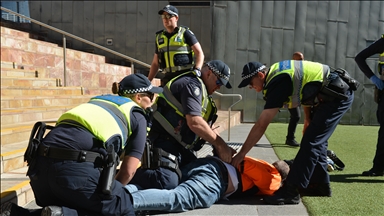Virus mutation won’t affect potential vaccines: Study
Australia’s national agency says virus has mutated, currently 85% of cases are those of ‘G-Strain’

ANKARA
Researchers in Australia Friday said that any further mutation of the novel coronavirus virus in new forms of strains won’t affect any possible vaccine to treat the infection.
The study by Commonwealth Scientific and Industrial Research Organization (CSIRO) -- Australia's national science agency -- said “G-strain” of the SARS-CoV-2 is currently the most dominant strain of the coronavirus.
“There has been some speculation about whether COVID-19 vaccines in development would still work against it,” said the study published on Friday.
Many countries are working to produce a vaccine to treat the coronavirus which has affected over 36 million people globally. Over 1 million COVID-19 infected people have died since first reported in Wuhan city of China last December.
“Our researchers have conducted an experiment that shows vaccines developed with an older virus strain should still work against the G-strain,” the study said.
It said while the coronavirus adapts to a new host, in this case humans, “it can mutate, creating new strains”.
“It’s normal for different dominant strains of the virus to appear over time,” said CSIRO’s “Dangerous Pathogens” team leader Dr. Vasan Vasan.
“Researchers analyze published genome sequences of virus samples to spot new strains and even track their spread around the world,” he said.
The study said the “D-strain” was the “initial version of the coronavirus, and vaccines were created to target its distinctive spike protein”.
The CSIRO is also working on a potential vaccine with Inovio Pharmaceuticals and Oxford University.
“But SARS-CoV-2 kept [coronavirus] mutating as it spread. A new strain bumped the ‘D-strain’ out of the top spot. It’s called the ‘G-strain’ or the D614G mutation. And it now accounts for about 85 per cent of cases worldwide,” the study added.
The researchers at the Australian science agency said they conducted tests on the new strain of the virus.
“Our researchers took blood samples from ferrets vaccinated with the Inovio candidate… The results were clear: samples from vaccinated ferrets showed a strong immune response against the virus. They developed neutralizing antibodies… even against the G-strain!” it added.
Anadolu Agency website contains only a portion of the news stories offered to subscribers in the AA News Broadcasting System (HAS), and in summarized form. Please contact us for subscription options.







